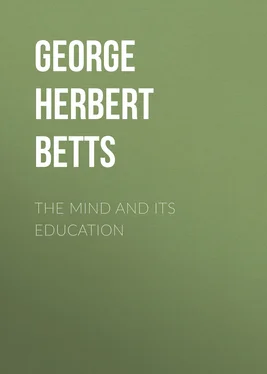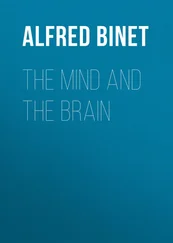George Herbert Betts - The Mind and Its Education
Здесь есть возможность читать онлайн «George Herbert Betts - The Mind and Its Education» — ознакомительный отрывок электронной книги совершенно бесплатно, а после прочтения отрывка купить полную версию. В некоторых случаях можно слушать аудио, скачать через торрент в формате fb2 и присутствует краткое содержание. Жанр: foreign_edu, pedagogy_book, foreign_psychology, на английском языке. Описание произведения, (предисловие) а так же отзывы посетителей доступны на портале библиотеки ЛибКат.
- Название:The Mind and Its Education
- Автор:
- Жанр:
- Год:неизвестен
- ISBN:нет данных
- Рейтинг книги:3 / 5. Голосов: 1
-
Избранное:Добавить в избранное
- Отзывы:
-
Ваша оценка:
- 60
- 1
- 2
- 3
- 4
- 5
The Mind and Its Education: краткое содержание, описание и аннотация
Предлагаем к чтению аннотацию, описание, краткое содержание или предисловие (зависит от того, что написал сам автор книги «The Mind and Its Education»). Если вы не нашли необходимую информацию о книге — напишите в комментариях, мы постараемся отыскать её.
The Mind and Its Education — читать онлайн ознакомительный отрывок
Ниже представлен текст книги, разбитый по страницам. Система сохранения места последней прочитанной страницы, позволяет с удобством читать онлайн бесплатно книгу «The Mind and Its Education», без необходимости каждый раз заново искать на чём Вы остановились. Поставьте закладку, и сможете в любой момент перейти на страницу, на которой закончили чтение.
Интервал:
Закладка:
1. Think of your home as you last left it. Can you see vividly just how it looked, the color of the paint on the outside, with the familiar form of the roof and all; can you recall the perfume in some old drawer, the taste of a favorite dish, the sound of a familiar voice in farewell?
2. What illustrations have you observed where the mental content of the moment seemed chiefly thinking (knowledge process); chiefly emotion (feeling process); chiefly choosing , or self-compulsion (willing process)?
3. When you say that you remember a circumstance that occurred yesterday, how do you remember it? That is, do you see in your mind things just as they were, and hear again sounds which occurred, or feel again movements which you performed? Do you experience once more the emotions you then felt?
4. What forms of expression most commonly reveal thought ; what reveal emotions? (i.e., can you tell what a child is thinking about by the expression on his face? Can you tell whether he is angry , frightened , sorry , by his face? Is speech as necessary in expressing feeling as in expressing thought?)
5. Try occasionally during the next twenty-four hours to turn quickly about mentally and see whether you can observe your thinking, feeling, or willing in the very act of taking place.
6. What becomes of our mind or consciousness while we are asleep? How are we able to wake up at a certain hour previously determined? Can a person have absolutely nothing in his mind?
7. Have you noticed any children especially adept in expression? Have you noticed any very backward? If so, in what form of expression in each case?
8. Have you observed any instances of expression which you were at a loss to interpret (remember that "expression" includes every form of physical action, voice, speech, face, form, hand, etc.)?
CHAPTER II
How do you rank in mental ability, and how effective are your mind's grasp and power? The answer that must be given to these questions will depend not more on your native endowment than on your skill in using attention.
1. NATURE OF ATTENTION
It is by attention that we gather and mass our mental energy upon the critical and important points in our thinking. In the last chapter we saw that consciousness is not distributed evenly over the whole field, but "piled up," now on this object of thought, now on that, in obedience to interest or necessity. The concentration of the mind's energy on one object of thought is attention.
The Nature of Attention.—Everyone knows what it is to attend. The story so fascinating that we cannot leave it, the critical points in a game, the interesting sermon or lecture, the sparkling conversation—all these compel our attention. So completely is our mind's energy centered on them and withdrawn from other things that we are scarcely aware of what is going on about us.
We are also familiar with another kind of attention. For we all have read the dull story, watched the slow game, listened to the lecture or sermon that drags, and taken part in conversation that was a bore. We gave these things our attention, but only with effort. Our mind's energy seemed to center on anything rather than the matter in hand. A thousand objects from outside enticed us away, and it required the frequent "mental jerk" to bring us to the subject in hand. And when brought back to our thought problem we felt the constant "tug" of mind to be free again.
Normal Consciousness Always in a State of Attention.—But this very effort of the mind to free itself from one object of thought that it may busy itself with another is because attention is solicited by this other . Some object in our field of consciousness is always exerting an appeal for attention; and to attend to one thing is always to attend away from a multitude of other things upon which the thought might rest. We may therefore say that attention is constantly selecting in our stream of thought those aspects that are to receive emphasis and consideration. From moment to moment it determines the points at which our mental energy shall be centered.
2. THE EFFECTS OF ATTENTION
Attention Makes Its Object Clear and Definite.—Whatever attention centers upon stands out sharp and clear in consciousness. Whether it be a bit of memory, an "air-castle," a sensation from an aching tooth, the reasoning on an algebraic formula, a choice which we are making, the setting of an emotion—whatever be the object to which we are attending, that object is illumined and made to stand out from its fellows as the one prominent thing in the mind's eye while the attention rests on it. It is like the one building which the searchlight picks out among a city full of buildings and lights up, while the remainder are left in the semilight or in darkness.
Attention Measures Mental Efficiency.—In a state of attention the mind may be likened to the rays of the sun which have been passed through a burning glass. You may let all the rays which can pass through your window pane fall hour after hour upon the paper lying on your desk, and no marked effects follow. But let the same amount of sunlight be passed through a lens and converged to a point the size of your pencil point, and the paper will at once burst into flame. What the diffused rays could not do in hours or in ages is now accomplished in seconds. Likewise the mind, allowed to scatter over many objects, can accomplish but little. We may sit and dream away an hour or a day over a page or a problem without securing results. But let us call in our wits from their wool-gathering and "buckle down to it" with all our might, withdrawing our thoughts from everything else but this one thing , and concentrating our mind on it. More can now be accomplished in minutes than before in hours. Nay, things which could not be accomplished at all before now become possible.
Again, the mind may be compared to a steam engine which is constructed to run at a certain pressure of steam, say one hundred and fifty pounds to the square inch of boiler surface. Once I ran such an engine; and well I remember a morning during my early apprenticeship when the foreman called for power to run some of the lighter machinery, while my steam gauge registered but seventy-five pounds. "Surely," I thought, "if one hundred and fifty pounds will run all this machinery, seventy-five pounds should run half of it," so I opened the valve. But the powerful engine could do but little more than turn its own wheels, and refused to do the required work. Not until the pressure had risen above one hundred pounds could the engine perform half the work which it could at one hundred and fifty pounds. And so with our mind. If it is meant to do its best work under a certain degree of concentration, it cannot in a given time do half the work with half the attention. Further, there will be much which it cannot do at all unless working under full pressure. We shall not be overstating the case if we say that as attention increases in arithmetical ratio, mental efficiency increases in geometrical ratio. It is in large measure a difference in the power of attention which makes one man a master in thought and achievement and another his humble follower. One often hears it said that "genius is but the power of sustained attention," and this statement possesses a large element of truth.
3. HOW WE ATTEND
Someone has said that if our attention is properly trained we should be able "to look at the point of a cambric needle for half an hour without winking." But this is a false idea of attention. The ability to look at the point of a cambric needle for half an hour might indicate a very laudable power of concentration; but the process, instead of enlightening us concerning the point of the needle, would result in our passing into a hypnotic state. Voluntary attention to any one object can be sustained for but a brief time—a few seconds at best. It is essential that the object change, that we turn it over and over incessantly, and consider its various aspects and relations. Sustained voluntary attention is thus a repetition of successive efforts to bring back the object to the mind. Then the subject grows and develops—it is living, not dead.
Читать дальшеИнтервал:
Закладка:
Похожие книги на «The Mind and Its Education»
Представляем Вашему вниманию похожие книги на «The Mind and Its Education» списком для выбора. Мы отобрали схожую по названию и смыслу литературу в надежде предоставить читателям больше вариантов отыскать новые, интересные, ещё непрочитанные произведения.
Обсуждение, отзывы о книге «The Mind and Its Education» и просто собственные мнения читателей. Оставьте ваши комментарии, напишите, что Вы думаете о произведении, его смысле или главных героях. Укажите что конкретно понравилось, а что нет, и почему Вы так считаете.












![Edward Ellis - Adrift on the Pacific - A Boys [sic] Story of the Sea and its Perils](/books/753342/edward-ellis-adrift-on-the-pacific-a-boys-sic-s-thumb.webp)